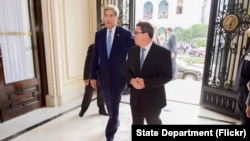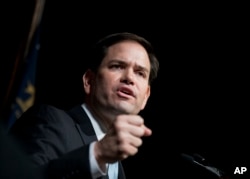For the first time since 1961 Cuba and the United States have diplomatic relations and Secretary of State John Kerry has raised the flag over the U.S. Embassy in Havana on Friday.
But significant issues remain between the two countries, despite President Obama's decision to renew diplomatic links. Much of the Cuban exile community in Florida, the closest U.S. state to Cuba, opposes opening relations with the Castro regime, as do many of Obama's Republican political opponents.
Human trafficking
Florida Senator Marco Rubio, a 2016 Republican presidential contender to succeed Obama, described the State Department's recent upgrade of Cuba's standing in its annual human trafficking report as "politically driven" and said the country has done "almost nothing" to curb child sex tourism on the island.
"The administration's unfounded elevation of Cuba on human trafficking sends a chilling message that the U.S., at least under this president, is more interested in headlines about its historic Cuba policy than it is in challenging the Castro regime to protect Cuba's youth from human trafficking exploitation," Rubio wrote to Kerry.
The report upgraded Cuba from the lowest "Tier 3" ranking to the "Tier 2 Watch List" reserved for countries deserving special scrutiny, even as the report was still highly critical of Havana.
Press freedoms
The president of a major Washington journalism group, John Hughes of the National Press Club, urged Kerry this week to make news media freedom and Internet access in Cuba a priority for U.S. policy makers.
"It's hard to imagine human rights, labor conditions, and corruption in the country getting any better absent the public accounting that comes with a reasonably free press," Hughes said. "Therefore, the United States should use all tools at its disposal, including diplomatic and economic, to support unrestricted reporting and the dissemination of information in Cuba."
Earlier this year, the New York-based Committee to Protect Journalists ranked Cuba as the 10th most censored country in the world for press freedoms. CPJ said Cuba has the most restricted climate for press freedom in the Americas.
Cuba is located 145 kilometers off the southeastern U.S. coast, but the two countries broke off diplomatic ties in 1961 after Cuban revolutionary Fidel Castro seized power in 1959. The current Cuban leader, President Raul Castro, and Obama announced a resumption in formal relations last December and talks have been held since then to ease business, trade and travel restrictions.






